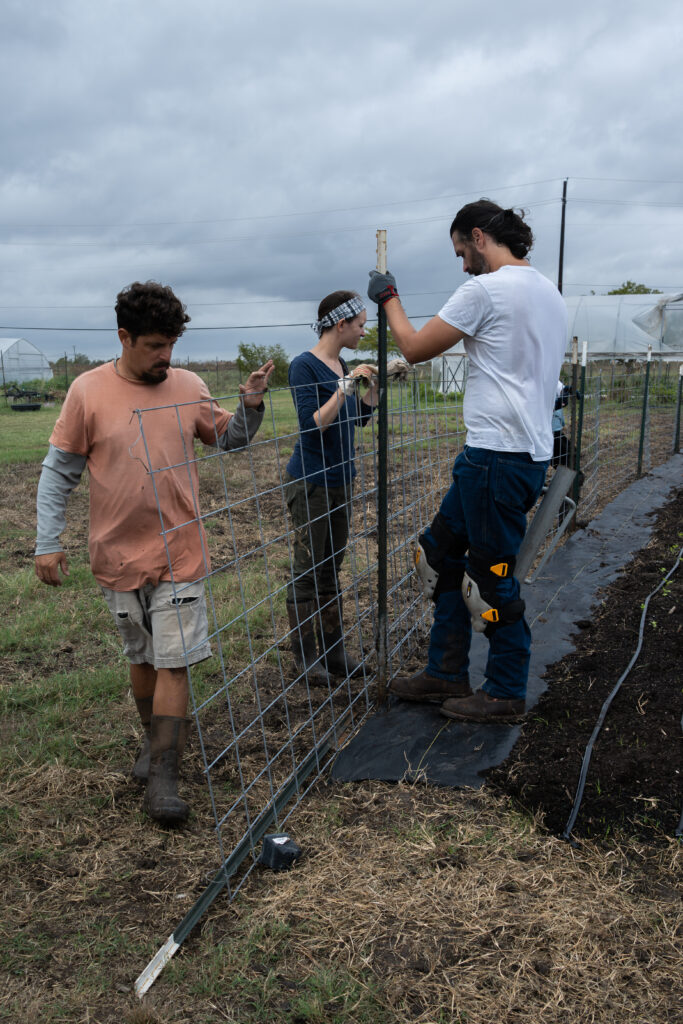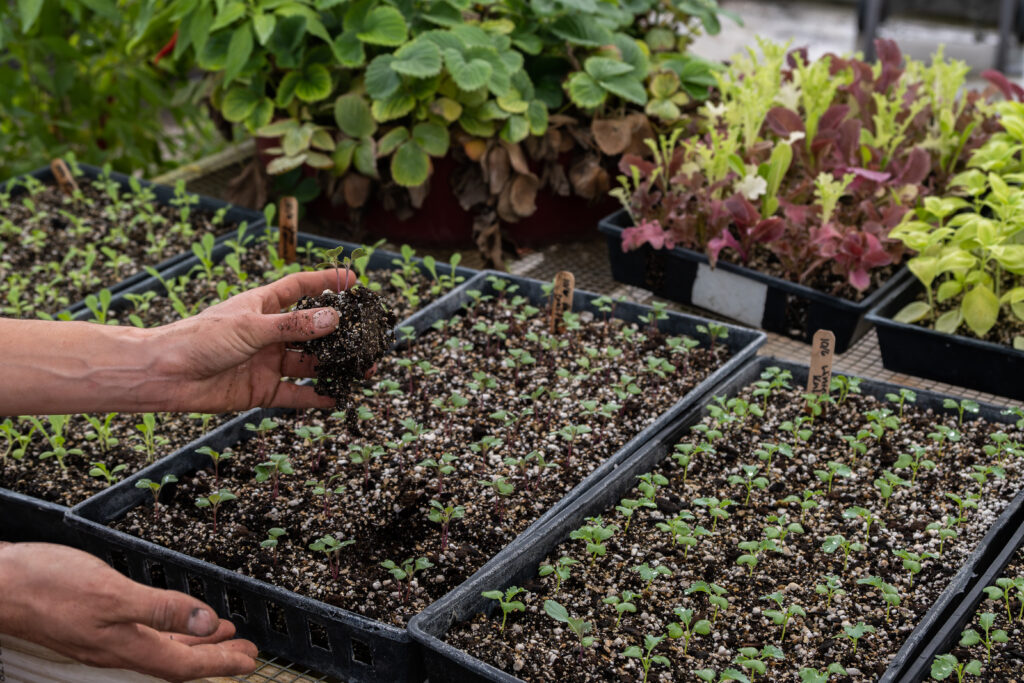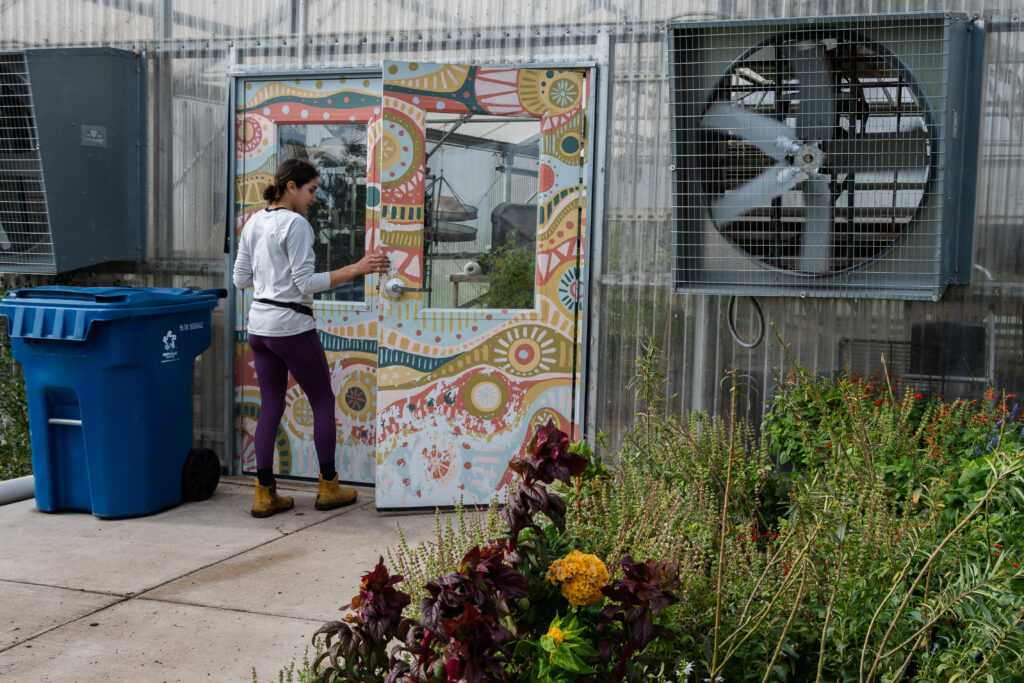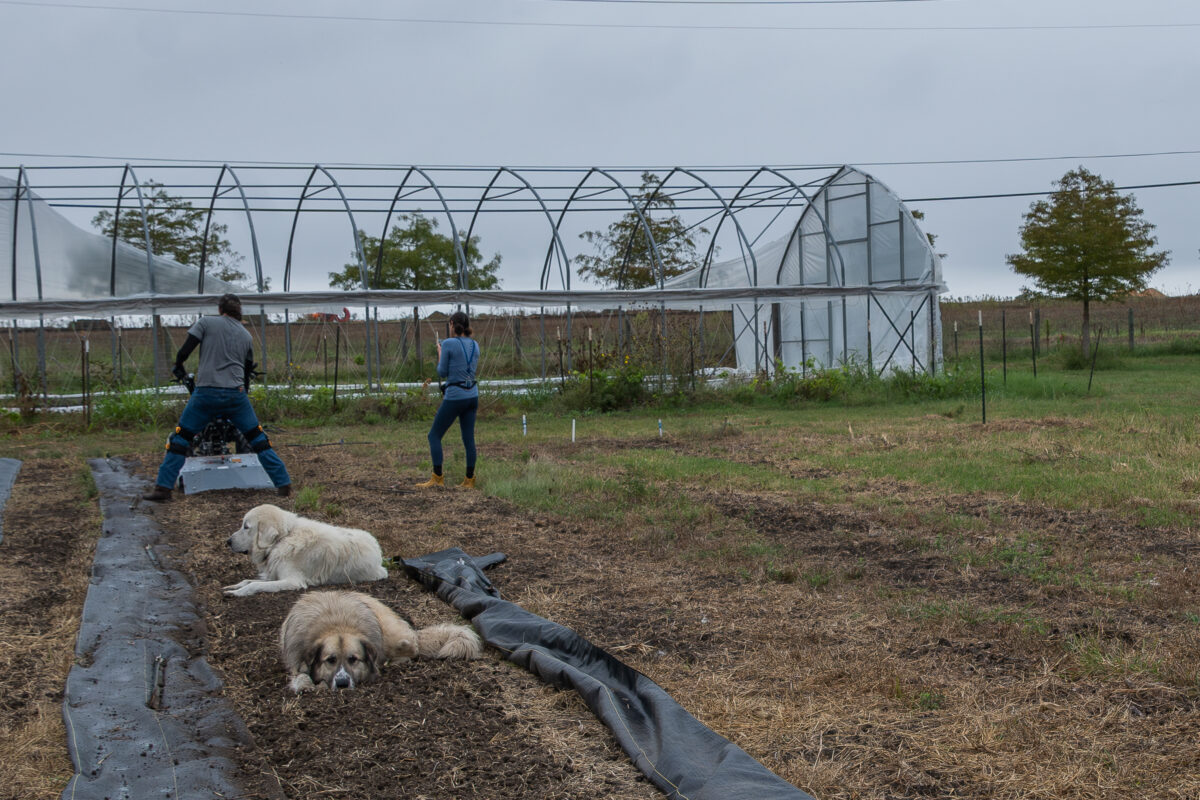By Nathan Adam Spear
This article was featured in the Fall 2023 issue of ACCENT Magazine
It was 2021, Matthew Olson was selling fresh produce at a farmer’s market in Elgin when another local job opportunity was brought to his attention by a couple of other regulars at the weekly market. The job? Farm Manager for the 17-acres of land outside Austin Community College’s campus in Elgin.
Olson had previously held a salary position in student services at the University of Texas but left after choosing to pursue his true dreams of full-time small-scale farming. Working since for a couple of Elgin’s local growers, but without having a preferred master’s degree in education or agriculture, he wasn’t hopeful after submitting his application for the ACC position. However, fast forward to a little over two years later; Olson is now giving tasks to over a dozen ACC students for the college’s first volunteer Friday, and the student farm itself is looking better than ever.
Located directly off Highway 290 is the Elgin campus’ main building and further in is the wide stretch of green being used for ACC’s Sustainable Agriculture Entrepreneurship Program. Here, students in the program can work with a fully functioning greenhouse and market garden, as well as learn about raising livestock and beekeeping with the farm’s specialized instructors.
Since arriving as manager, Olson has been working with Senior Lab Assistant Miranda Maldanado to keep the student farm running and improving in between classes. Recently — with the help of several interns and other members of their department — the two have been working on some new developments for the educational space as well. Most notably, they have started adding several new rows of produce on the land outside of the market garden, in a project referred to as “expansion”. Most exciting, Olson emphasizes, is the new chicken coup being welded by Professor Hunter Eichman and the farm’s interns for the addition of laying hens on the farm.
“I really feel grateful to be here, to be able to share my passion and try to really grow this program with the really cool people here,” said Olson.

I had first met the student farm’s manager with Maldanado outside of their typical grassy environment and selling fresh produce from a stall outside of the Highland campus. Appearing weekly on Mondays in Elgin and Wednesdays at Highland, the two farmer’s had started the small stands last year to distribute the market garden’s fresh produce and raise awareness for the program. The money that they make from the stands comes back directly to the farm’s operating budget, and Olson adds that the financial records provide an additional lesson for students to, “understand that farming is a business too.”
Maldanado agrees, emphasizing, “you need to know your accounting, you need to know your math, have records and keep your receipts.”
Consistently selling out weekly, the farm stand’s success in reaching students has also helped them address the growing need for more hands around the farm. In October, to celebrate Campus Sustainability Month, ACC’s agricultural science course began opening their doors – or perhaps, fences – every Friday for students outside of the course to check out and help around the school’s 17-acre farm.
Olson says, “we’re trying to serve as an example for the ACC community that [sustainable farming] is doable, it’s important, and it’s here for them.”
On the first Friday, volunteers enjoyed a welcome morning breeze while removing weeds from the farm’s large market garden. Olson, in the suggested dress code of working boots and floppy hat, was joined by the similarly styled Senior Lab Assistant Miranda Maldanado in delegating tasks; her high energy complimented the farm manager’s mellower tone. Beyond pulling weeds, the first volunteers – including Sustainability Manager Amber Orr, several members of ACC’s Green Team and myself – also replanted several trays of seedlings that came from the farm’s greenhouse.
Tucked in the corner of the garden, the greenhouse is a translucent structure that looks much more industrial than its surrounding area; largely due to the two protruding vents in the front that help regulate the environment inside. Maldonado explains that nearly all of the farm’s various melons, peppers, leafy greens, and other plants start as seeds grown inside of the greenhouse; the classroom-sized lab has a controlled climate that gives the seedlings a better chance of surviving their early stages. After retrieving the young plants, volunteers began moving them into the pasture’s high tunnel.

The high tunnel is a skeleton of metal poles covered with a large translucent tarp — standing tall outside of the market garden, it looks like a cross between the greenhouse and a very large tent. The structure’s tunnel shape regulates the internal climate by using the clear tarp walls and roof like a magnifying glass for the light coming in on the plants, effectively lengthening their warm season inside. Unfortunately, for some time and on that first Friday, the high tunnel’s tarp was tattered from damage sustained by strong winds, but Maldanado assured us that a replacement covering was on its way. Working with, or around, the weather has been an obstacle lately, according to Maldanado who is thankful for the departure of the previous Summer’s record-breaking heat – which required the farm crew to rework hours and hold off on the stand for the whole month of August.
With planting soon finished and noon arriving, the volunteers were dismissed after being offered some extra produce to take home from the market garden. Besides attracting new students to the program, Maldanado says the goal of the farm’s new volunteer Fridays is, “to show where your food comes from, how it’s prepared, how it’s grown, and all the work and labor that goes into it.”
Several years ago – before Olson’s arrival – Maldanado was the department’s first intern, and she remembers that not-so-distant time when the farm and market garden wasn’t as populated nor as impressive. When she started her internship in 2020, the farm was in its beginning stages and so was COVID-19.
With the farm being an outside space, Maldanado and the department’s previous Lab Assistant were still able to work during lockdown, but this work was slow with just the two of them and no farm manager or community engagement. At that point, the high tunnel was just metal frames surrounding overgrown grass and the market garden was reduced to only a few rows of tomatoes and beets.
“[The farm] was very much just kind of for learning purposes,” says Maldanado, “so it’s really cool to compare to now when every row has something planted and we have a plan.”

The development of the student farm has been a long-time project for ACC – ever since the school’s Elgin campus opened in 2010 with the intention of adding courses in agricultural science. The arrival of ACC’s voter-elected bond in 2014 is what started making those plans a reality, by starting a continuing education course in sustainable agriculture and beginning two phases of construction at the Elgin campus for the facilities needed to offer related associate degrees.
When phase two of construction finished in 2018, the associate degree courses were set to start in 2020 and agricultural science was finally recognized as its own department by ACC. Prior to this recognition, the student farm was under the direction of Program Coordinator Evelyn Rosas and ACC’s Continuing Education Division, who had been sustaining the farm’s new greenhouse, orchard, and market garden at the time with their non-credit classes.
After the new degree courses were offered, however, Rosas and the CED were taken out of the program and Savannah Rugg was soon brought in as the inaugural department chair. Rugg, who was 26 years old at the time and the program’s only full-time faculty member, had a slow start in getting the new department fully realized and maintained.
“I had some experience in higher education,” she says, referring to the several years she spent as a teaching and lab assistant at the University of Texas Rio Grande, “but there was definitely a learning curve [when coming to the ACC position].”
Navigating ACC’s bureaucracy was, and is, its own challenge – plus the pandemic’s arrival with the new courses didn’t help speed things up much either; but Rugg was able to keep things moving with online and hybrid classes. In 2021, as things were getting safer, Rugg says she “hit the jackpot” after bringing on Olson as the new farm manager, whose first project was fully revitalizing the market garden.
Now, after seeing the student farm’s continued growth – literally – and the successful transfer of students in the program to nearby universities, Rugg has found herself successful in pushing the program further than it has ever been previously. But that doesn’t mean she is slowing down now either; a few days before I spoke to her, Rugg returned from a conference about “incubator farms” which she plans to implement in Spring at the Elgin campus. The incubator farms would be small plots of land on the student farm’s acres for growers to use and manage independently from the land used by the Agricultural Sciences Department.
The farm continues to struggle with student engagement despite its rapid improvements. “Not a lot of people even know that we are out here,” says Rugg, who is hoping that collaboration with other campuses and departments will help change that.
Passion for sustainable farming and getting the community engaged with it appears to be shared by all the members of the department that I spoke with. After listening to the several educational farmers’ passionate beliefs about the vital significance of small farms and practicing mindful consumption, I experienced an almost cult-like persuasion as I began to have life-altering thoughts about off-the-grid sustainability – but ultimately ceased when I started to question whether I look good enough in overalls.
Specifically, Olson says that, “disengaging from oppressive [food] systems by growing your own food, engaging in your local economy, and treating yourself well by not putting chemicals into your body are very important things for every individual to do on some level, not that everyone has to farm.”
He is right that not everyone has to farm to live sustainably, but with the farm gates now open every Friday from 9 a.m. to 12 p.m. for the entire ACC community, it has never been easier for you to, as Olson puts it, “get your hands dirty”.


